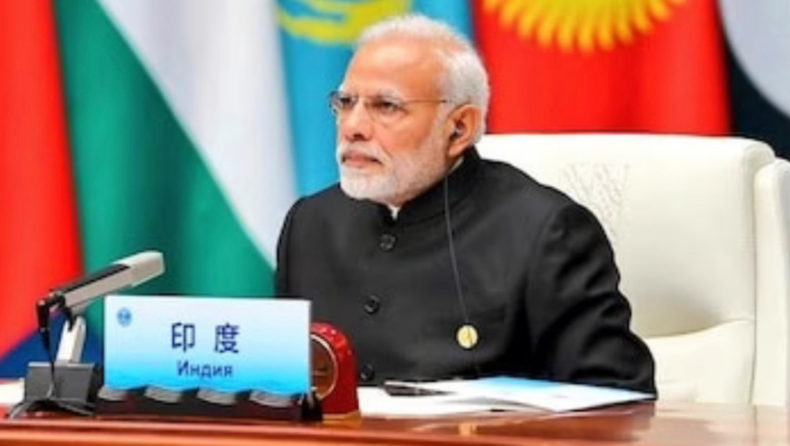PM Modi blames war and COVID-19 for the food and energy crises
Pakistan’s refusal to grant transit access
At the Shanghai Cooperation Organization (SCO) Council of Heads of State (CHS) summit held on Friday, Prime Minister Narendra Modi made reference to Pakistan’s refusal to grant India transit trade access by land to Afghanistan and Central Asia. He also pointed out that better regional connectivity is only feasible if members grant each other “full transit rights”.

Greater cooperation in the Eurasian region
In a speech that avoided the discussion of India’s regional disputes with Pakistan and China over territorial sovereignty and terrorism, Mr. Modi requested greater cooperation in the Eurasian region. He also highlighted the “unprecedented” energy and food crisis caused by the COVID-19 pandemic and the conflict in Ukraine. When India takes over the SCO’s chairmanship and hosts the Summit in the middle of 2024, he also emphasized on manufacturing efforts that India is willing to test out in the upcoming year.
He also emphasized the industrial projects that India is eager to test out in the coming year when it takes over the SCO‘s chairmanship and hosts the Summit in the middle of 2024.
Foreign Secretary Vinay Kwatra told the media that Prime Minister Modi brought the issue of terrorism to light during the “restricted” meeting involving the SCO leaders. Ir was also conveyed that all SCO countries have agreed to compile a list of terrorist entities and individuals in their respective countries.
Mr. Shariff on Afghanistan and Pakistan floods
In response to Mr. Modi’s remarks in his speech, Mr. Shariff largely emphasized on Afghanistan and the flood situation in Pakistan, by calling for a more “structured” SCO approach to connectivity in the region, adding that provided there is connectivity, transit rights will automatically follow.
The Floods in Pakistan
There have been 1,678 deaths in Pakistan due to floods since June 14, 2022. Extreme heat waves and subsequent melting of glaciers contributed to the flooding, which in turn is linked to climate change. Described as the worst in the country’s history, this flood is the deadliest in the globe since the South Asian floods of 2017. Pakistan issued a national emergency declaration on August 25th due to the flooding.
The government of Pakistan has calculated that the floods have cost the country $40 billion.
Pakistan’s climate change minister Sherry Rehman reported that the provinces of Sindh and Balochistan had received 784% and 500% more rainfall than average in August. India and Bangladesh also saw monsoon rains that were above normal. One of the fastest warming oceans is the Indian Ocean, which has increased in temperature by an average of 1 °C (1.8 °F) (although global temperatures are presently 1.2 °C (2.2 °F) over pre-industrial levels, oceans generally are at roughly 0.7 °C (1.3 °F) above pre-industrial levels).
Increases in monsoon rainfall are predicted as a result of rising sea surface temperatures. Furthermore, in May and June, southern Pakistan saw record-breaking heat waves that were rendered more likely by climate change. Heavy precipitation was brought about because of these conditions, which led to the formation of a powerful thermal low. Glacial flooding in Gilgit-Baltistan was another consequence of the heatwaves.
Pakistan is one of the most at-risk regions due to climate change while contributing less than 1 percent of global greenhouse gas emissions. Flooding was made up to 50 percent worse and future flooding is more likely due to global warming, according to a study by an international team of climate experts. One of the causes of the increased severity of the floods in Pakistan is the country’s widespread practise of deforestation.
What do Pakistan’s delays in granting access routes mean?
India has developed Iran’s Chabahar port as an alternative route to Pakistan, Central Asia, and Russia. Currently, Pakistani delays have meant that India’s plan to send 50,000 MT of wheat to Afghanistan via land route has been delayed for several months, as the transportation of the final tranche of 10,000 MT has not been permitted.
The SCO summit declaration concluded with the addition of Iran as a full member to the group of eight countries, which included four Central Asian states, China, Russia, India, and Pakistan because President Ebrahim Raisi signed an MoU acceding membership.
Belarus is one of the other prospective members, to face Western sanctions in the future. The group also adopted over 40 documents, including a cooperation and good neighbor agreement and a joint statement on climate change.
Mr. Modi stated that one of the other issues that the world faces is ensuring “food security,” and it is also an issue that Mr. Mirziyoyev recounted in his opening remarks, emphasizing that SCO countries account for the majority of the nations that the world’s exporting grains in the world.












